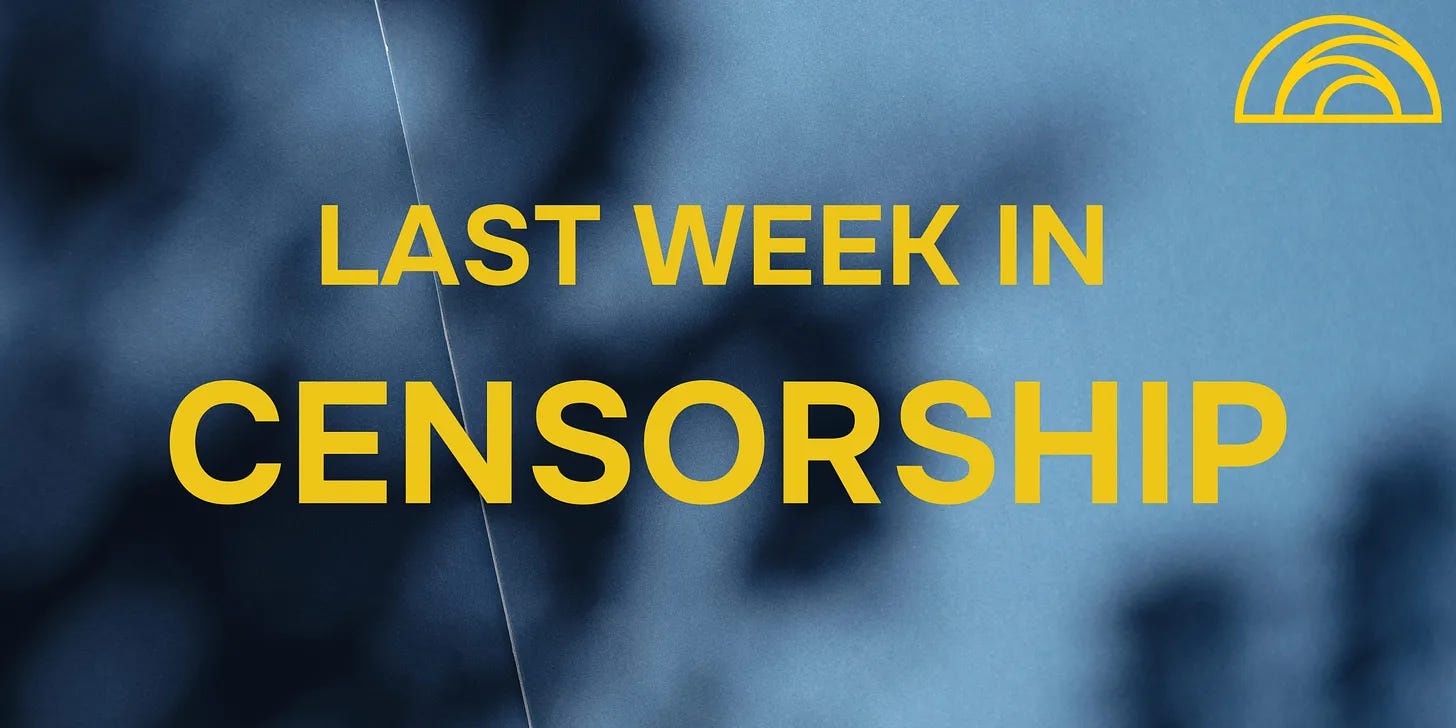Last Week in Censorship: July 6-12, 2025
The Trump administration escalates its war on critics by sanctioning UN officials, investigating former intelligence leaders, and redefining protest activities as violent tactics.
If you appreciate our work, click the ❤️above to let the world know and help Substack's recommendation algorithm show it to more people. 🙏🏻☀️
The Trump administration sanctions a UN official for criticism of Israel while launching criminal investigations into former FBI and CIA directors over the 2016 election probe. Meanwhile, federal agencies redefine basic protest activities as violent tactics and state officials threaten tech companies for allowing AI to express unfavorable opinions about Trump.
State-Sponsored Intimidation, Propaganda, and Unwinding Civil Rights Protections
FBI launches criminal investigations into former CIA Director Brennan and former FBI Director Comey. The Justice Department confirmed criminal probes into two frequent Trump targets who played roles in investigating his 2016 campaign's ties to Russia. CIA Director John Ratcliffe referred Brennan for allegedly lying to Congress about the 2017 intelligence assessment concluding Putin sought to help Trump. The investigations resurrect issues that special counsel John Durham already examined for years without charging either man, suggesting the new probes are driven more by political retaliation than new evidence of wrongdoing.
Secret Service tracked former FBI Director James Comey using cell phone surveillance after social media post. The New York Times revealed that the Secret Service had Comey followed by law enforcement in unmarked cars and tracked his cellphone location after he posted an Instagram photo of seashells arranged to spell "86 47." Federal agents waited at Comey's home and escorted him for questioning after using an administrative subpoena to access his cell data. The extensive surveillance operation demonstrates how the administration treats even ambiguous political expression as potential threats requiring counterterrorism-level response.
Retaliation Against Critics
Trump administration sanctions UN official Francesca Albanese for criticism of Israel. Secretary of State Marco Rubio announced sanctions against the UN Special Rapporteur for the Occupied Palestinian Territories, who has been critical of Israel's military campaign in Gaza. The sanctions, based on Trump's executive order targeting the International Criminal Court, will likely bar the Italian national from traveling to the U.S. and block any assets she has in the country. The move represents an unprecedented escalation in targeting international officials for their criticism of U.S. allies and threatens to undermine the UN system and international law.
Trump threatens 50% tariffs on Brazil to defend ally Jair Bolsonaro facing coup charges. In an unprecedented move, Trump announced massive tariffs specifically to pressure Brazil to drop criminal charges against former president Bolsonaro, who is facing trial for allegedly plotting to overturn his 2022 election loss. The letter departed from Trump's standard tariff justifications, explicitly linking trade policy to domestic political prosecutions in another country. Brazilian President Lula vowed reciprocal tariffs and rejected U.S. interference in Brazil's sovereign judicial proceedings.
Missouri Attorney General threatens tech companies over AI responses critical of Trump. Andrew Bailey sent threatening letters to Google, Microsoft, OpenAI, and Meta claiming their AI chatbots violated consumer protection laws because some ranked Trump poorly on antisemitism when prompted. Bailey demanded "all internal records" about AI training and threatened to strip companies of Section 230 protections while exempting Elon Musk's Grok and a Chinese company's AI that ranked Trump more favorably. The investigation targets companies solely for allowing AI to express opinions Bailey disagrees with.
Suppressing Press Freedom
Department of Homeland Security tells police to treat common protest activities as "violent tactics." Internal DHS bulletins urge law enforcement to consider skateboarding, bicycling, livestreaming, and wearing masks as potential signs of violent intent during protests. The guidance instructs officers to prepare "from the point of view of an adversary" and frames protesters on foot as potential "scouts" searching for weapons. Civil liberties advocates warn the broad definitions could "easily lead to excessive force against people who are simply exercising their First Amendment rights."





